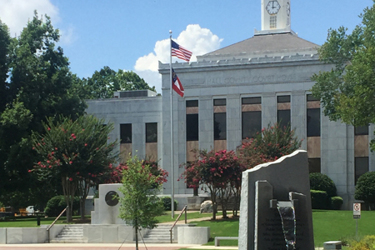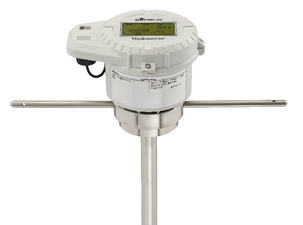Smart Technology Helps Plug The Water Loss Drain
By Dan Pinney

One city’s approach to leak detection
In a world driven by technology, data is the key to better understanding everything from personal behavior to business performance. For water utilities, collecting data through smart technology is essential for better operations, customer service, and conservation efforts.
Accurate, timely data is a challenge many utilities face in the race to identify and reduce water loss. With more than 900 billion gallons potentially lost annually due to household water leaks in the U.S.1, smart technology can help address this issue and equip utilities for a more sustainable future.
For instance, the City of Gainesville, Georgia, known for its beautiful parks, gardens, and Lake Lanier, uses the latest technology to address these challenges, including wasteful leaks and the negative impact of non-revenue water (NRW).
Focus On Innovation
Gainesville’s Department of Water Resources is making good on their pledge to deliver value to the more than 58,500 residents and businesses in their community.
“Our customers look to us to provide the highest level of reliability and quality in their water service,” said the City of Gainesville’s Utility Senior Database/AMI Analyst Jeremy Rylee. “Innovation plays a major role in helping us anticipate and deliver on their needs.”
Gainesville’s dedication to innovation kept the city at the forefront of their water metering efforts, as they evolved from manual meter reads to automatic meter reading (AMR). The shift to drive-by reading allowed technicians to more effectively capture data.
“Our team understood the power information gives you to make decisions,” said Rylee. “The more accurate and efficient you can be with collecting data, the faster you can put it to good use.”
Gainesville embarked on a major network overhaul to streamline operations and enhance customer service. The city decided to install a smart utility network to transition to remote monitoring and lay a foundation for future services.
Gain Control Of Water Loss
Gainesville deployed the solution across more than 58,500 endpoints with residential and commercial smart water meters. The meters, combined with a licensed, two-way communication network, opened the doors for remote monitoring of water consumption and, in some cases, water loss.
“We used the real-time data from the system to monitor for trends like continuous usage,” said Rylee. “When technicians saw something out of the ordinary, they could reach out to the customer to address the issue before it showed up on their water bill.”
Rylee recalled a large gas station customer that showed signs of ongoing usage. Technicians called the customer to see if there was a problem.
“Turns out they had a service line leak near the building that was spilling out underground and not visible,” said Rylee. “Resolving the issue helped the business cut their bill by more than a thousand dollars and save who knows how much money had the leak gone on undetected.”
Extend Customer Value
The Gainesville team was so impressed with the system’s continuous use alerts that they sought to extend the benefits of data to customers by deploying a web-based customer portal. The secure portal allows residents and businesses to remotely monitor and make informed decisions about their water usage.
“We have customers that use the data to help manage their budgeting,” said Rylee. “It helps them save money by being more conscientious with their usage.”
Sustainability Measures
Conservation is also a priority for the city, as Georgia’s water loss regulations continue to tighten. Gainesville is taking steps to improve its operational sustainability by reducing non-revenue water and automating manual practices.
“Sustainability is an objective that will only increase over time,” said Rylee. “Having the flexibility to advance our network will help us meet new conservation demands.”
Gainesville specifically targeted water loss in the northern region of their service territory and created a district metered area (DMA). They installed four additional meters by simply tapping an existing pipeline without any interruption to the water supply. This zone is now set up to accurately measure totalized flow at the boundaries. Combined with approximately 1,500 customer meters also on their communication network, Gainesville now has the ability to perform hourly water balances.
“This gives us great system visibility in one particular zone where we can quantify non-revenue water and use the data to optimize operations,” said Rylee.

An easily-installed electromagnetic insertion flow meter from Xylem helps utilities perform hourly water balances in a district metered area.
Future Impact
Gainesville’s smart utility network is also helping the city’s operations during the COVID-19 pandemic. Remote management and monitoring allow city technicians to serve customers from a safe distance. But Rylee has even bigger things in mind to positively impact the community.
“We’re exploring more ways to use our system to enhance water quality management,” said Rylee. “There are many factors that make a difference in the process of ensuring a safe, adequate water supply for the future.”
Gainesville is piloting remote shutoff meters and battery-powered sensor interfaces for pressure monitoring across several zones to ensure asset durability and water loss detection. The city is also testing advanced control methods for remote flushing to maintain high standards for water quality.
“It all goes back to innovation for us,” said Rylee. “We’re always looking for ways to get better for customers and the Sensus solution gives us the tools we need to find them.”
Lead By Example
The City of Gainesville’s story goes to show that providing quality service starts with laying the right foundation. Their innovation journey positions them for success in meeting current and future challenges. By investing in smart technologies, utilities can follow Gainesville’s example and chart a path to a more sustainable, customer-focused future.
1 The United States Environmental Protection Agency, WaterSense: Statistics and Facts; https://www.epa.gov/watersense/statistics-and-facts
 Dan Pinney is the vice president of global water product management for Sensus, a Xylem brand. Drawing on his more than three decades of industry experience, Pinney works with utilities to deploy smart solutions that help optimize everything from billing and asset utilization to non-revenue water.
Dan Pinney is the vice president of global water product management for Sensus, a Xylem brand. Drawing on his more than three decades of industry experience, Pinney works with utilities to deploy smart solutions that help optimize everything from billing and asset utilization to non-revenue water.
